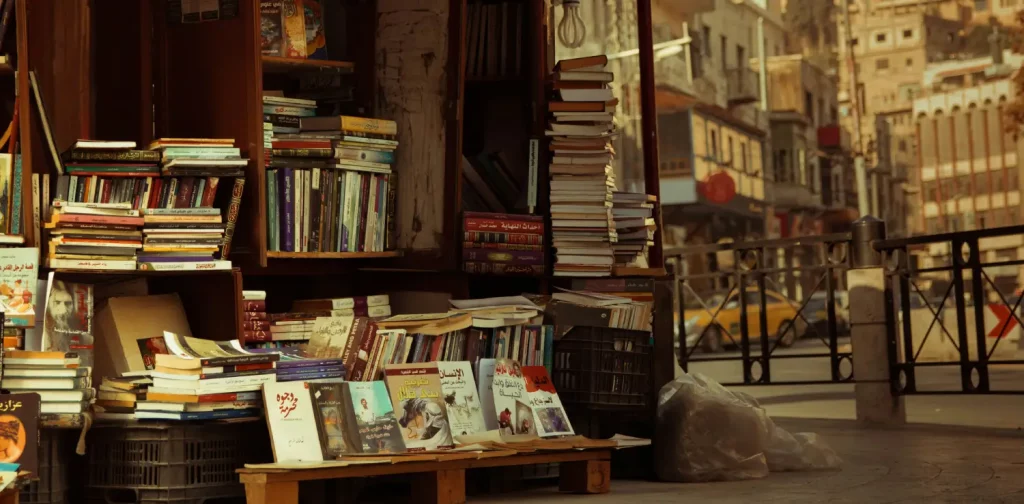Books, Libraries, and Communities in the Time of Crisis

Photo: Ayman Yusuf on Unsplash.
Whether looking for fresh insights or deeply engaging stories, reading books offers valuable experiences. Despite technological advancement and the internet, libraries are still vital in ensuring books are available everywhere. In the middle of conflicts, libraries and communities can foster hope for the people affected.
Books in Wartime
War and conflict leave a lasting impact on everything, including people and the environment. In the education sector, these events can lead to higher chances of school dropouts. The affected students and communities can lose access to books because they cannot afford them or because the libraries have been destroyed during conflicts. In Gaza, for instance, libraries and bookshops are among the many buildings destroyed by Israeli force attacks.
Beyond entertainment, books and stories can be powerful tools for seeking solace and strength. They also provide a way to maintain access to education and preserve culture during wartime. In this case, libraries and communities become essential to people’s survival and empowerment in a crisis.
Libraries Without Borders
Bibliothèques Sans Frontières (Libraries Without Borders) is a humanitarian non-profit whose works revolve around bringing knowledge to those in need. In essence, Libraries Without Borders (LWB) deploys innovative approaches to build libraries and communities in places of conflict.
Libraries and communities are essential aspects of disaster relief efforts. One of LWB’s programs is the Ideas Box, a mobile multimedia center and learning hub. This pop-up library consists of books, crafts materials, a satellite for internet connection, laptops, tablets, and other tools that provide educational and cultural resources for refugees, displaced persons, and other communities in need. For children who need specific care during humanitarian crises, books and other entertainment kits can help them cope with stress and develop resilience.
“This library reminds us that education and culture are fundamental resources during war. They give a direction, a broader horizon. They are the resources that help these people grow and become healthier, happier, and more inspired participants in society,” said Hlib Lobanov from the Czech NGO People in Need.
The organization partnered with LWB to deploy an Ideas Box in Drohobytch, Ukraine, after the war escalated in 2022. LWB is currently deploying seven installments of Ideas Box across the country in collaboration with local communities.
Furthermore, the program also allows space for communities to grow. “One day in December, we welcomed more than 500 children and teenagers from the occupied territories around Donetsk,” said Anastassia Moldovan, the Director of the Kvadrat Regional Youth Center in Vinnytsia, Ukraine.
Fostering Libraries and Communities in Crisis
Over 100 million people are forcibly displaced globally. Ensuring access to books, information, and education is critical in a crisis to empower the affected people with hope and resilience. Therefore, humanitarian care must include efforts to foster libraries and communities.
Still, beyond empowering people in crisis with libraries and communities, the world must shift its focus to ending all forms of war, conflict, and violence. Governments and international organizations are responsible for creating environments where people can thrive safely and healthily in peace.
Editor: Nazalea Kusuma

Co-create positive impact for people and the planet.
Amidst today’s increasingly complex global challenges, equipping yourself, team, and communities with interdisciplinary and cross-sectoral insights on sustainability-related issues and sustainable development is no longer optional — it is a strategic necessity to stay ahead and stay relevant.

Kresentia Madina
Madina is the Assistant Manager of Stakeholder Engagement at Green Network Asia. She holds a bachelor’s degree in English Studies from Universitas Indonesia. As part of the GNA In-House Team, she supports the organization's multi-stakeholder engagement across international organizations, governments, businesses, civil society, and grassroots communities through digital publications, events, capacity building, and research.


 Impacts of E-waste Pollution on Animals and Human Health
Impacts of E-waste Pollution on Animals and Human Health  Africa’s Solar Energy Surge: Why 2025 Was a Breakthrough Year
Africa’s Solar Energy Surge: Why 2025 Was a Breakthrough Year  Agrihoods: Integrating Farms and Urban Neighborhoods into Sustainable Communities
Agrihoods: Integrating Farms and Urban Neighborhoods into Sustainable Communities  Women in Waste Management: Asia’s Circularity Runs on Women. Its Policies Still Don’t
Women in Waste Management: Asia’s Circularity Runs on Women. Its Policies Still Don’t  Embracing the Business Value of Sustainability
Embracing the Business Value of Sustainability  American Farmers Call for Government Support Amidst PFAS Contamination
American Farmers Call for Government Support Amidst PFAS Contamination